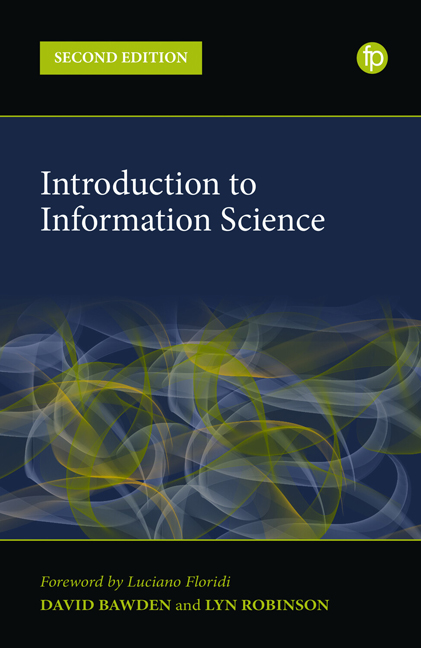Book contents
- Frontmatter
- Contents
- Figures
- Preface
- Foreword – Curators of Semantic Capital
- List of Acronyms
- 1 The Information Science Discipline
- 2 History of Information: the Story of Documents
- 3 Philosophies of Information
- 4 Paradigms, Turns and Theories in the Information Sciences
- 5 Information
- 6 Documents and Documentation
- 7 Domain Analysis
- 8 Information Organisation
- 9 Digital Technologies and Data Systems
- 10 Information Systems
- 11 Informetrics
- 12 Information Behaviour
- 13 Communicating Information: Changing Contexts
- 14 Information Management and Policy
- 15 Information Law and Ethics
- 16 Information Society
- 17 Digital (Onlife) Literacies
- 18 Research in the Information Sciences
- 19 The Future of the Information Sciences
- Additional Resources
- Index
10 - Information Systems
Published online by Cambridge University Press: 21 April 2022
- Frontmatter
- Contents
- Figures
- Preface
- Foreword – Curators of Semantic Capital
- List of Acronyms
- 1 The Information Science Discipline
- 2 History of Information: the Story of Documents
- 3 Philosophies of Information
- 4 Paradigms, Turns and Theories in the Information Sciences
- 5 Information
- 6 Documents and Documentation
- 7 Domain Analysis
- 8 Information Organisation
- 9 Digital Technologies and Data Systems
- 10 Information Systems
- 11 Informetrics
- 12 Information Behaviour
- 13 Communicating Information: Changing Contexts
- 14 Information Management and Policy
- 15 Information Law and Ethics
- 16 Information Society
- 17 Digital (Onlife) Literacies
- 18 Research in the Information Sciences
- 19 The Future of the Information Sciences
- Additional Resources
- Index
Summary
Our dependence on increasingly pervasive technology has served to make it a significant determinant of the modern human condition. To comprehend this condition, one must therefore understand the human–machine relationship.
Sachi Arafat and Elham Ashoori (2019, 1)Introduction
In Chapter 9 we gave an overview of digital technologies and some of their applications. In this chapter we examine their use in information systems, focusing on the kinds of systems of particular interest to information science. After an initial look at the concept of information itself, we cover four general kinds of system: for retrieval of data and information; for managing documents in libraries, repositories and other collections; for facilitating the processes of digital scholarship; and for supporting creativity and innovation.
Information systems
An information system is a formal socio-technical system to collect, process and share information of any kind. It is a means to link people, information and technology to carry out particular tasks in a defined manner. We might think of pre-digital systems, such as a collection of records with access via a card index as an information system, and such a system would fit our general description. However, information systems are generally under - stood to be digital systems, comprising hardware and software, interfaces for data entry and information access, roles for the people involved and clearly specified processes governing their operation. They may be general purpose, or specific in nature. General-purpose systems are described by terms such as business information systems, management information systems, decision-support systems, enterprise systems, group-support or cooperative-working systems, and transaction-processing systems. Domainspecific examples are health information systems, and geographic information systems. For overviews of the current information systems, see Whiteley (2013) and Valacich and Schneider (2018), for reflections on the nature and significance of such systems, see Checkland and Holwell (1998) and Swanson (2020) and for a perspective on the broader concept of system, see Siskin (2016).
The ways in which information systems are created and modified are generally termed systems analysis and design (Dennis, Wixom and Roth, 2019).
- Type
- Chapter
- Information
- Introduction to Information Science , pp. 189 - 206Publisher: FacetPrint publication year: 2022



